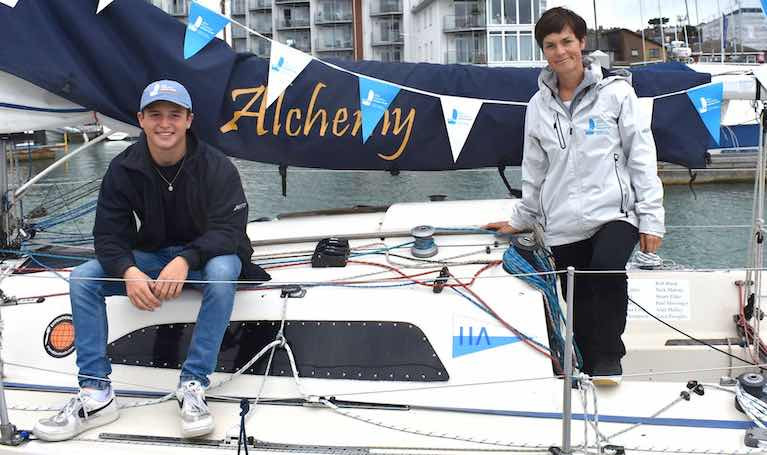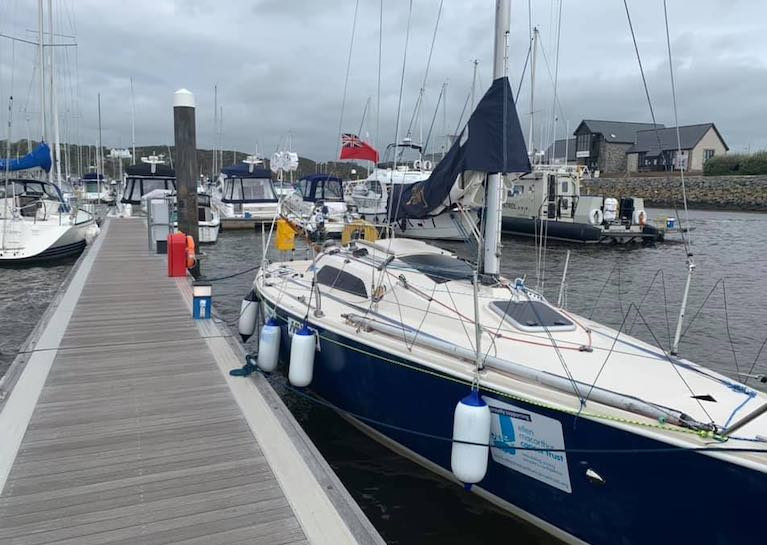Displaying items by tag: Timothy Long
Timothy Long Becomes Youngest Person to Sail Solo Around Britain
Fifteen-year-old sailor Timothy Long spent his summer on a 1,600 nautical mile anti-clockwise voyage around the British coast. Now he has broken the record of Tom Webb, who sailed around Britain aged 17 in 2011. Timothy, from Aylesbury, has become the youngest person to sail solo around Britain while so far raising over £7,000 to support his heroine, Dame Ellen MacArthur's young person's cancer charity (Thursday 1 October).
Ellen MacArthur has been Timothy's greatest inspiration since reading her books as child. When he learned about the Ellen MacArthur Cancer Trust – the national charity that empowers young people aged 8-24 to embrace their future after cancer through sailing and outdoor adventure – he wanted to help. He was too young to volunteer so decided to fundraise. After plucking up the courage to email Ellen – having told his mum "I can't write to her, she's a Dame"- a copy of her book 'Full Circle' and an Ellen MacArthur Cancer Trust baseball cap, both signed by Ellen with the words "Go for it!" arrived out of the blue.
Inspired by Ellen's encouragement and that she had sailed round Britain aged 18, Timothy donned his Trust cap to follow her lead on his 28ft Hunter Impala, 'Alchemy'.
Having set out from Hamble, Southampton on 16 July, Timothy's venture (See Afloat.ie 1st, 6th and 14th September) brought him in early September to Bangor Marina from where he left on 4th September, calling at Ardglass on the County Down coast on his way south. He arrived yesterday (Wednesday 30 September) in the Isle of Wight where he received a warm welcome from Ellen herself, ahead of his final leg to Hamble.
Timothy said: "The Ellen MacArthur Cancer Trust does amazing work with young people to rebuild their confidence after cancer treatment, and the experience of being together on a boat can be a real turning point for people who have been through the worst of times".
Reflecting on his voyage Timothy said "My 20-hour passage between Eyemouth to Stonehaven in Scotland made me think of being in the shoes of the young people the Trust supports. I can't even imagine being diagnosed with cancer at this age, but people are and have to go through years of treatment, it's crazy. How can you return back to normal life after such a terrible experience without the support of the Trust?"
Timothy's first sailed a dinghy on a reservoir near Swindon aged nine. During his voyage, he sailed an average 50 miles per day, with several passages of up to 100 miles. He battled giant waves, gale force winds, 17 hours in thick fog in the Bristol Channel and on occasions sailed for 24 hours straight, sleeping for just 20 minutes at a time. There have been wonderful moments too; of perfect sailing, magical sunrises and sunsets and beautiful scenery and wildlife including dolphins, seals, birds and even a pilot whale.
Ellen said: "It is an incredible achievement for anyone to sail single-handed around Britain, but to do it at 15 really is something else. While Timothy will always have the personal satisfaction of that achievement, the legacy of what he's done will be even more far-reaching in terms of helping to change the lives of young people in recovery from cancer. I send Timothy my warmest congratulations and thank him on behalf of every young person the Trust supports."
To support Timothy go to www.justgiving.com/fundraising/roundbritain2020 and for more information about the Ellen MacArthur Cancer Trust visit www.ellenmacarthurcancertrust.org
Timothy Long & Alchemy Continue South on Round Britain Solo Voyage
As reported in Afloat.ie on 1st September here, fifteen-year-old solo sailor Timothy Long from Buckinghamshire is fundraising for the Ellen McArthur Cancer Trust by sailing solo around Britain, a distance of approximately 1600 miles.
In his Hunter Impala 28 'Alchemy' he called at Bangor Marina on his way south from the Clyde and left for his home port of Southampton on 4th September stopping off in Ardglass on the south Down coast before heading for Holyhead.
He arrived at Holyhead on Sunday 6th September after 15 hours at sea. Timothy said "Arriving here felt like a real milestone as crossing the Irish Sea has been something that I have had on my mind for a while! It wasn't a whole load of fun either although it started off well and we were averaging 5.5 knots, the sea state quite quickly became confused and choppy to the point where we were only doing 2.5 kts which was incredibly frustrating. However, we had a pretty cool encounter with a pod of 20 Dolphins which was absolutely brilliant and was the highlight of the day!"
Having had to delay his departure from Holyhead by about 18 hours due to adverse weather, he arrived in Pwllheli Marina in North Western Wales on Friday (11th) which he says was frustrating as it meant he had to sail through the night.
He continued "The passage to Pwllheli started off quite bumpy with big standing waves, which of course feel even bigger in the dark".
Timothy will head off tomorrow for Fishguard, then Milford Haven but he needs a weather window to cross the Bristol Channel. At this stage he has raised £4500 of the £5000 target.

























































